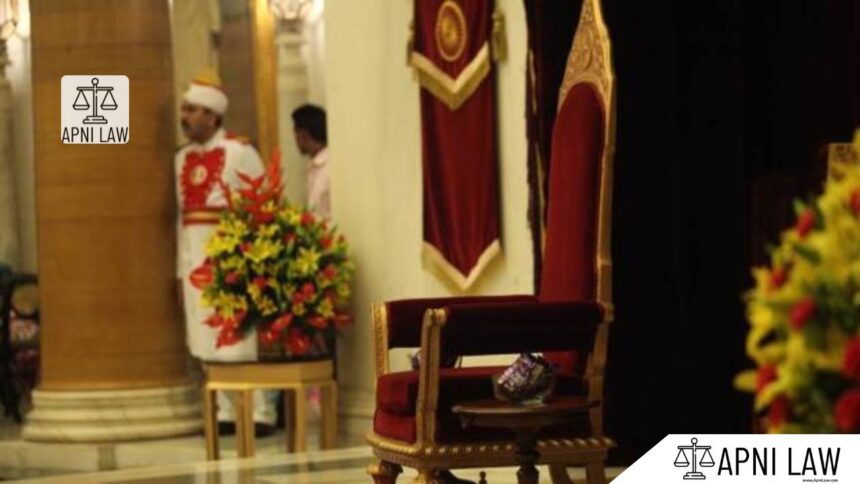The President of India holds a unique position in the Indian Constitution. As the constitutional head of state, the President exercises executive, legislative, judicial, and emergency powers. These powers of the President are exercised mostly on the advice of the Council of Ministers, but they play a vital role in maintaining the unity of the nation and the stability of governance. The President’s authority extends across administration, lawmaking, justice, and crisis management, making the office central to constitutional order.
What Are the Executive Powers of the President?
The President serves as the formal head of the Union executive. All government actions are carried out in the President’s name. This ensures the continuity of the state even when governments change. The President appoints the Prime Minister, who must command the confidence of the Lok Sabha. The Council of Ministers is also appointed by the President on the advice of the Prime Minister.
The President also appoints key constitutional authorities. These include Governors of states, the Attorney General of India, the Comptroller and Auditor General, the Chief Election Commissioner and other Election Commissioners, the Chairman and members of the Union Public Service Commission, and members of the Finance Commission. These appointments safeguard the impartiality and independence of important institutions.
The President has the right to seek information from the Prime Minister. If the President feels an issue requires reconsideration, the Council of Ministers must review the matter. The President also directly administers Union Territories through appointed administrators. In addition, the President has the authority to declare scheduled areas and tribal areas, ensuring special protection and governance for vulnerable communities.
Through these powers, the President becomes the central pivot of the executive system, even though the daily governance is run by the elected government.
What Are the Legislative Powers of the President?
The President plays an important legislative role. The President summons Parliament, prorogues it, and can dissolve the Lok Sabha. Every new parliamentary session begins with the President’s address to both Houses, outlining the government’s policy agenda.
The President can also convene joint sittings of Parliament to resolve deadlocks between the Lok Sabha and Rajya Sabha, except in the case of money bills. This power ensures smooth lawmaking when disagreements arise.
The President nominates 12 members to the Rajya Sabha from fields such as literature, art, science, and social service. In addition, the President can nominate two members of the Anglo-Indian community to the Lok Sabha, though this provision has been discontinued after the 104th Constitutional Amendment.
A bill becomes law only after the President’s assent. The President may return a non-money bill for reconsideration, compelling Parliament to reflect on it again. The President can also withhold assent indefinitely, which is popularly known as the “pocket veto.”
When Parliament is not in session, the President can promulgate ordinances under Article 123. These ordinances have the same force as laws but must be approved by Parliament within six weeks of reassembly.
The President also decides on the disqualification of Members of Parliament after consulting the Election Commission. Reports of the Comptroller and Auditor General, the Finance Commission, and the Union Public Service Commission are placed before Parliament by the President.
Thus, the President acts as the guardian of parliamentary procedures and the constitutional lawmaking process.
What Are the Judicial Powers of the President?
The President plays a significant role in the judiciary. The President appoints the Chief Justice of India and other judges of the Supreme Court and High Courts. Judicial independence remains intact, but the President’s role in appointments highlights the constitutional balance.
Under Article 143, the President can seek the Supreme Court’s advisory opinion on matters of law or fact of public importance. Although the Court’s opinion is not binding, it helps the President act with constitutional guidance.
The President also holds the power of clemency under Article 72. This includes granting pardons, commutations, remissions, reprieves, and respites in cases involving punishment under Union law, military court-martial, or death sentences. This mercy jurisdiction reflects the humanitarian face of the Constitution and provides a final safeguard against miscarriage of justice.
The President enjoys immunity from court proceedings during the tenure of office. No criminal proceedings can be initiated, and civil proceedings can be initiated only with two months’ prior notice. The only exception is the process of impeachment if the President violates the Constitution.
In this way, the President functions both as a protector of justice and as a constitutional guardian of the judiciary.
What Are the Emergency Powers of the President?
The emergency powers of the President highlight the extraordinary role the office can play during crises. The Constitution provides for three types of emergencies: National Emergency under Article 352, President’s Rule in a state under Article 356, and Financial Emergency under Article 360.
During a National Emergency, declared in cases of war, external aggression, or armed rebellion, the Union government assumes sweeping powers. The Parliament can legislate on subjects in the State List, and the President can extend the tenure of the Lok Sabha. Fundamental Rights under Article 19 stand suspended, while rights under Articles 20 and 21 remain protected.
Under Article 356, President’s Rule can be imposed in a state when its constitutional machinery fails. The President assumes the powers of the state government, and the Governor functions on behalf of the Union. This provision has been misused in the past, but the Supreme Court’s landmark ruling in S.R. Bommai v. Union of India placed strict checks on arbitrary dismissal of state governments.
Article 360 empowers the President to declare a Financial Emergency if the credit or financial stability of India is threatened. During such a period, the Union can issue directions to states regarding financial matters, salaries, and expenditures. Although this provision exists, it has never been invoked in India’s history.
These powers reveal how the President becomes the ultimate defender of the nation during extraordinary circumstances.
How Do the President’s Powers Safeguard the Constitution?
The President’s powers, though exercised on ministerial advice, serve as a vital safeguard for constitutional democracy. The executive powers ensure smooth administration, while legislative powers maintain parliamentary accountability. Judicial powers preserve justice and humanitarian considerations. Emergency powers act as the ultimate shield in times of crisis.
The President symbolizes the unity of the nation. The authority vested in the President ensures that constitutional provisions are followed in both normal and exceptional times. While the real power rests with the Council of Ministers, the President’s presence provides stability, continuity, and legitimacy to the system of governance.
For any specific query call at +91 – 8569843472
Conclusion
The office of the President of India is not just ceremonial. It is the backbone of constitutional democracy. Through executive, legislative, judicial, and emergency powers, the President safeguards the rule of law, ensures the balance of power, and protects the unity and integrity of India. The President functions as the constitutional conscience-keeper of the Republic, ensuring that governance remains within the framework of the Constitution.
The powers of the President highlight the strength of India’s parliamentary democracy. Even though most actions occur on ministerial advice, the President’s role remains central to constitutional governance, justice, and crisis management.








